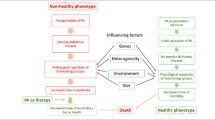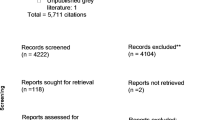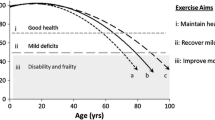Abstract
Background
Volunteering among older people has the potential to deliver health benefits to the individual, along with economic and social benefits to society. However, it is not clear whether healthier people are more likely to engage in volunteering, whether volunteering improves health, or the extent to which the relationship may be reciprocal. There is an identified need for longitudinal work, especially in the form of randomized controlled trials, to establish causality.
Aims
To assess the effects of commencing volunteering among older non-volunteers utilizing a randomized controlled trial approach involving per-protocol and pragmatic analyses.
Methods
Of the 445 Australians aged 60 + years who participated in the study, 201 were assigned to an intervention arm that required them to participate in a minimum of 1 h/week of formal volunteering in a position of their choice. The remaining participants were assigned to a control condition and asked to continue their lives as usual, but were not discouraged from commencing volunteering.
Results
Across the assessed physical, psychological, and social variables, a significant difference in sit-to-stand scores was found in both the per-protocol and pragmatic analyses, and a further significant difference in the fast pace walk was identified in the pragmatic analyses.
Conclusion
The results provide some support for policies and programs designed to encourage older people to engage in volunteering to maintain or improve their health.
Trial registration
Australian and New Zealand Clinical Trials Registry ACTRN12615000091505.

Similar content being viewed by others
References
Stephens C (2017) From success to capability for healthy ageing: shifting the lens to include all older people. Crit Public Health 27:490–498. https://doi.org/10.1080/09581596.2016.1192583
World Health Organization (2015) World Report on Ageing and Health. World Health Organization, Geneva
Dubas-Jakóbczyk K, Kocot E, Kissimova-Skarbek K et al (2017) Economic evaluation of health promotion and primary prevention actions for older people—a systematic review. Eur J Public Health 27:670–679. https://doi.org/10.1093/eurpub/ckx030
Cherry KE, Jackson Walker E, Silva Brown J et al (2013) Social engagement and health in younger, older, and oldest-old adults in the Louisiana healthy aging study. J Appl Gerontol 32:51–75. https://doi.org/10.1177/0733464811409034
Cooper R, Stafford M, Hardy R et al (2014) Physical capability and subsequent positive mental wellbeing in older people: findings from five HALCyon cohorts. Age 36:445–456. https://doi.org/10.1007/s11357-013-9553-8
Daskalopoulou C, Stubbs B, Kralj C et al (2017) Physical activity and healthy ageing: a systematic review and meta-analysis of longitudinal cohort studies. Ageing Res Rev 38:6–17. https://doi.org/10.1016/j.arr.2017.06.003
Hamer M, Lavoie KL, Bacon SL (2014) Taking up physical activity in later life and healthy ageing: the English longitudinal study of ageing. Br J Sports Med 48:239–243. https://doi.org/10.1136/bjsports-2013-092993
Peel NM, McClure RJ, Bartlett HP (2005) Behavioral determinants of healthy aging. Am J Prev Med 28:298–304. https://doi.org/10.1016/j.amepre.2004.12.002
Schneider N, Yvon C (2013) A review of multidomain interventions to support healthy cognitive ageing. J Nutr Health Aging 17:252–257. https://doi.org/10.1007/s12603-012-0402-8
Anderson ND, Damianakis T, Kröger E et al (2014) The benefits associated with volunteering among seniors: a critical review and recommendations for future research. Psychol Bull 140:1505–1533. https://doi.org/10.1037/a0037610
Connolly S, O’shea E (2015) The perceived benefits of participating in voluntary activities among older people: do they differ by volunteer characteristics? Act Adapt Aging 39:95–108. https://doi.org/10.1080/01924788.2015.1024075
Jenkinson CE, Dickens AP, Jones K et al (2013) Is volunteering a public health intervention? A systematic review and meta-analysis of the health and survival of volunteers. BMC Public Health 13:773. https://doi.org/10.1186/1471-2458-13-773
Kail BL, Carr DC (2017) Successful aging in the context of the disablement process: working and volunteering as moderators on the association between chronic conditions and subsequent functional limitations. J Gerontol B Psychol Sci Soc Sci 72:340–350. https://doi.org/10.1093/geronb/gbw060
Kim ES, Konrath SH (2016) Volunteering is prospectively associated with health care use among older adults. Soc Sci Med 149:122–129. https://doi.org/10.1016/j.socscimed.2015.11.043
Carson ED (1999) Comment: on defining and measuring volunteering in the United States and abroad. Law Contemp Probl 62:67–71
Cnaan RA, Amrofell L (1994) Mapping volunteer activity. Nonprofit Volunt Sect Q 23:335–351
Lee Y, Brudney JL (2012) Participation in formal and informal volunteering: implications for volunteer recruitment. Nonprofit Manag Leadersh 23:159–180. https://doi.org/10.1002/nml.21060
Australian Institute of Health and Welfare (2018) Older Australia at a Glance. AIHW, Canberra
Douglas H, Georgiou A, Westbrook J (2017) Social participation as an indicator of successful aging: an overview of concepts and their associations with health. Aust Health Rev 4:455–462. https://doi.org/10.1071/ah16038
Fried LP, Carlson MC, Freedman M et al (2004) A social model for health promotion for an aging population: initial evidence on the Experience Corps model. J Urban Health 81:64–78. https://doi.org/10.1093/jurban/jth094
Lum TY, Lightfoot E (2005) The effects of volunteering on the physical and mental health of older people. Res Aging 27:31–55. https://doi.org/10.1177/0164027504271349
Burr JA, Han SH, Tavares JL (2015) Volunteering and cardiovascular disease risk: does helping others get “under the skin?”. Gerontologist 56:937–947. https://doi.org/10.1093/geront/gnv032
Gupta S (2018) Impact of volunteering on cognitive decline of the elderly. J Econ Ageing 12:46–60. https://doi.org/10.1016/j.jeoa.2018.01.002
Proulx CM, Curl AL, Ermer AE (2018) Longitudinal associations between formal volunteering and cognitive functioning. J Gerontol B Psychol Sci Soc Sci 73:522–531. https://doi.org/10.1093/geronb/gbx110
Li Y-P, Chen Y-M, Chen C-H (2013) Volunteer transitions and physical and psychological health among older adults in Taiwan. J Gerontol B Psychol Sci Soc Sci 68:997–1008. https://doi.org/10.1093/geronb/gbt098
Tomioka K, Kurumatani N, Hosoi H (2017) Association between the frequency and autonomy of social participation and self-rated health. Geriatr Gerontol Int 17:2537–2544. https://doi.org/10.1111/ggi.13074
Li Y, Ferraro KF (2005) Volunteering and depression in later life: social benefit or selection processes? J Health Soc Behav 46:68–84. https://doi.org/10.1177/002214650504600106
Binder M, Freytag A (2013) Volunteering, subjective well-being and public policy. J Econ Psychol 34:97–119. https://doi.org/10.1016/j.joep.2012.11.008
Kahana E, Bhatta T, Lovegreen LD et al (2013) Altruism, helping, and volunteering: pathways to well-being in late life. J Aging Health 25:159–187. https://doi.org/10.1177/0898264312469665
Brown KM, Hoye R, Nicholson M (2012) Self-esteem, self-efficacy, and social connectedness as mediators of the relationship between volunteering and well-being. J Soc Serv Res 38:468–483. https://doi.org/10.1080/01488376.2012.687706
Carr DC, Kail BL, Matz-Costa C et al (2018) Does becoming a volunteer attenuate loneliness among recently widowed older adults? J Gerontol B Psychol Sci Soc Sci 73:501–510. https://doi.org/10.1093/geronb/gbx092
Carlson MC, Saczynski JS, Rebok GW et al (2008) Exploring the effects of an “everyday” activity program on executive function and memory in older adults: experience Corps®. Gerontologist 48:793–801
Rook KS, Sorkin DH (2003) Fostering social ties through a volunteer role: implications for older-adults’ psychological health. Int J Aging Hum Dev 57:313–337. https://doi.org/10.2190/nbbn-eu3h-4q1n-uxhr
Tang F (2006) What resources are needed for volunteerism? A life course perspective. J Appl Gerontol 25:375–390. https://doi.org/10.1177/0733464806292858
Kelemen M, Mangan A, Moffat S (2017) More than a ‘little act of kindness’? Towards a typology of volunteering as unpaid work. Sociology 51:1239–1256. https://doi.org/10.1177/0038038517692512
Patsopoulos NA (2011) A pragmatic view on pragmatic trials. Dialogues Clin Neurosci 13:217–224
Pettigrew S, Jongenelis M, Newton R et al (2015) Research protocol for a randomized controlled trial of the health effects of volunteering for seniors. Health Qual Life Outcomes 13:74. https://doi.org/10.1186/s12955-015-0263-z
Australian Bureau of Statistics (2018) 2033.0.55.001—Census of Population and Housing: Socio-Economic Indexes for Areas (SEIFA), Australia, 2016. ABS, Canberra
Rantanen KK, Strandberg TE, Stenholm SS et al (2015) Clinical and laboratory characteristics of active and healthy aging (AHA) in octogenarian men. Aging Clin Exp Res 27:581–587. https://doi.org/10.1007/s40520-015-0329-0
Taaffe DR, Simonsick EM, Visser M et al (2003) Lower extremity physical performance and hip bone mineral density in elderly black and white men and women: cross-sectional associations in the Health ABC Study. J Gerontol A Bio Sci Med Sci 58:M934–M942
Choi L, Ward SC, Schnelle JF et al (2012) Assessment of wear/nonwear time classification algorithms for triaxial accelerometer. Med Sci Sports Exerc 44:2009. https://doi.org/10.1249/MSS.0b013e318258cb36
Santos-Lozano A, Santin-Medeiros F, Cardon G et al (2013) Actigraph GT3X: validation and determination of physical activity intensity cut points. Int J Sports Med 34:975–982. https://doi.org/10.1055/s-0033-1337945
Tennant R, Hiller L, Fishwick R et al (2007) The Warwick-Edinburgh Mental Well-being Scale (WEMWBS): development and UK validation. Health Qual Life Outcomes 5:63
Radloff LS (1977) The CES-D scale: a self-report depression scale for research in the general population. Appl Psychol Meas 1:385–401. https://doi.org/10.1177/014662167700100306
Hyland ME, Sodergren SC (1996) Development of a new type of global quality of life scale, and comparison of performance and preference for 12 global scales. Qual Life Res 5:469–480. https://doi.org/10.1007/BF00540019
Rosenberg M (1965) Society and the adolescent self-image. Princeton University Press, Princeton
Schwarzer R, Jerusalem M (1995) Generalized Self-Efficacy scale. Measures in health psychology: a user’s portfolio. Causal and control beliefs. NFER-NELSON, Windsor
Ryff CD (1989) Happiness is everything, or is it? Explorations on the meaning of psychological well-being. J Pers Soc Psychol 57:1069–1081. https://doi.org/10.1037/0022-3514.57.6.1069
Cutrona CE, Russell DW (1987) The provisions of social relationships and adaptation to stress. In: Jones WH, Perlman D (eds) Advances in personal relationships, vol 1. JAI Press. Greenwich, CT, pp 37–67
Olanrewaju O, Kelly S, Cowan A et al (2016) Physical activity in community dwelling older people: a systematic review of reviews of interventions and context. PLoS ONE. https://doi.org/10.1371/journal.pone.0168614
Bandinelli S, Milaneschi Y, Ferrucci L (2009) Chair stands test and survival in the older population. J Am Geriatr Soc 57:2172–2173. https://doi.org/10.1111/j.1532-5415.2009.02544.x
Acknowledgements
The authors wish to thank Nicole Biagioni, Zenobia Talati, and the team of staff and students at Curtin University and the Vario Health Clinic at Edith Cowan University for their assistance with data collection.
Funding
This work was supported by an Australian Research Council Discovery Grant (DP140100365).
Author information
Authors and Affiliations
Contributions
SP conceptualized the study and took primary responsibility for preparing the manuscript. MJ conducted the analyses and assisted with study design and manuscript preparation. RN, BJ, and JW provided conceptual input for the study design and contributed to the preparation of the manuscript. The funder played no role in the conducting of the research or the reporting of the results.
Corresponding author
Ethics declarations
Disclosure of potential conflicts of interest
The authors declare that they have no conflict of interest.
Ethical approval
All the procedures performed in studies involving human participants were in accordance with the ethical standards of the institutional and/or national research committee and with the 1964 Helsinki Declaration and its later amendments or comparable ethical standards.
Statement on the welfare of animals
This article does not contain any studies with animals performed by any of the authors.
Informed consent
Informed consent was obtained from all individual participants included in the study.
Additional information
Publisher's Note
Springer Nature remains neutral with regard to jurisdictional claims in published maps and institutional affiliations.
Electronic supplementary material
Below is the link to the electronic supplementary material.
Rights and permissions
About this article
Cite this article
Pettigrew, S., Jongenelis, M.I., Jackson, B. et al. A randomized controlled trial and pragmatic analysis of the effects of volunteering on the health and well-being of older people. Aging Clin Exp Res 32, 711–721 (2020). https://doi.org/10.1007/s40520-019-01241-3
Received:
Accepted:
Published:
Issue Date:
DOI: https://doi.org/10.1007/s40520-019-01241-3




